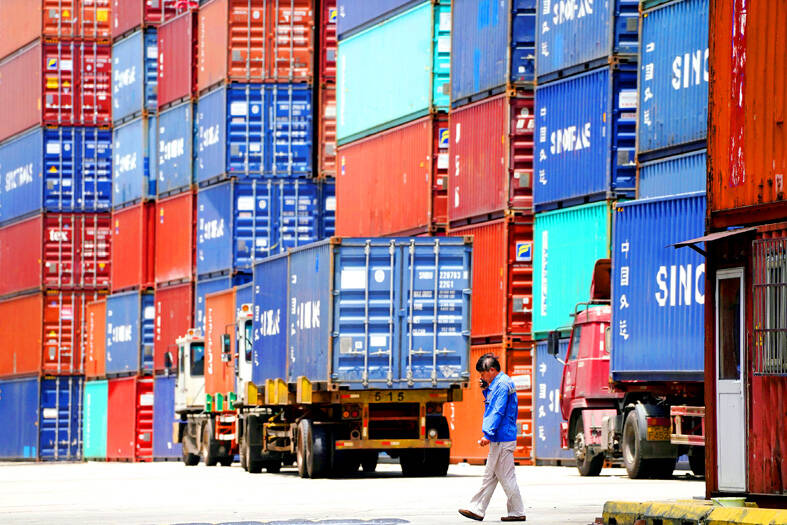China has dropped trade measures targeting Lithuania that the Baltic nation deemed illegal as the two governments discuss how to gradually move toward normalizing diplomatic relations.
A regime of “economic coercion” that was challenged at the WTO, including Lithuania being “deleted from the customs systems so no business are able to export to China,” has ended, Lithuanian Minister of Foreign Affairs Gabrielius Landsbergis told reporters in an interview on Monday.
Lithuania became embroiled in a dispute with China in 2021 after allowing Taiwan to set up a representative office under the nation’s name.

Photo: Reuters
China responded by withdrawing its ambassador to Lithuania and imposing an effective trade ban on the EU member state.
Landsbergis said that while the block on goods had now been lifted, businesses were still wary about conducting trade with China.
“There’s a huge trust issue, not just from the government, but from the business as well,” he said. “Since it has been done in the past, nobody can be sure that it cannot be repeated because it’s a non-rules-based approach.”
Chinese official customs data show little recovery in direct bilateral trade.
Imports from Lithuania were down more than 70 percent in the first 10 months of this year compared with the same period in 2021, before the row broke out.
Trade between Beijing and Lithuania collapsed in the months after the spat, with China only importing US$60,000 of goods from Lithuania in January last year, a 99.8 percent drop from a year earlier.
The EU responded on behalf of Lithuania, taking China to the WTO.
That case is still pending.
The Chinese Ministry of Foreign Affairs reiterated that Lithuania’s action on Taiwan was “wrong” and that its response was “legitimate” in protecting its interests.
“The problem is fundamentally with the Lithuanian side,” it said in a written response. “China has always acted in accordance with WTO rules and will handle relevant issues in accordance with relevant rules.”
Landsbergis said his government had been talking to China for almost two years about normalizing diplomatic relations.
“We’re having a conversation, which, I am saying, with patience, I think could provide some opportunities,” he said.
Neither side has officially reinstated its diplomats in the other country.
Leaders from the EU are expected to travel to China next week for an annual summit.
Any reduction of tensions with Lithuania might help in removing one point of conflict between the two sides.
There has also been no change to the name of Taiwan’s representative office in Vilnius, the deputy head of the Department of European Affairs at the Ministry of Foreign Affairs in Taipei said.
“This is a non-issue,” he said at a regular briefing on Tuesday.

SHIPS, TRAINS AND AUTOMOBILES: The ministry has announced changes to varied transportation industries taking effect soon, with a number of effects for passengers Beginning next month, the post office is canceling signature upon delivery and written inquiry services for international registered small packets in accordance with the new policy of the Universal Postal Union, the Ministry of Transportation and Communications said yesterday. The new policy does not apply to packets that are to be delivered to China, the ministry said. Senders of international registered small packets would receive a NT$10 rebate on postage if the packets are sent from Jan. 1 to March 31, it added. The ministry said that three other policies are also scheduled to take effect next month. International cruise ship operators

NUMBERS IMBALANCE: More than 4 million Taiwanese have visited China this year, while only about half a million Chinese have visited here Beijing has yet to respond to Taiwan’s requests for negotiation over matters related to the recovery of cross-strait tourism, the Tourism Administration said yesterday. Taiwan’s tourism authority issued the statement after Chinese-language daily the China Times reported yesterday that the government’s policy of banning group tours to China does not stop Taiwanese from visiting the country. As of October, more than 4.2 million had traveled to China this year, exceeding last year. Beijing estimated the number of Taiwanese tourists in China could reach 4.5 million this year. By contrast, only 500,000 Chinese tourists are expected in Taiwan, the report said. The report

Temperatures are forecast to drop steadily as a continental cold air mass moves across Taiwan, with some areas also likely to see heavy rainfall, the Central Weather Administration (CWA) said. From today through early tomorrow, a cold air mass would keep temperatures low across central and northern Taiwan, and the eastern half of Taiwan proper, with isolated brief showers forecast along Keelung’s north coast, Taipei and New Taipei City’s mountainous areas and eastern Taiwan, it said. Lows of 11°C to 15°C are forecast in central and northern Taiwan, Yilan County, and the outlying Kinmen and Lienchiang (Matsu) counties, and 14°C to 17°C

STEERING FAILURE: The first boat of its class is experiencing teething issues as it readies for acceptance by the navy, according to a recent story about rudder failure The Hai Kun (海鯤), the nation’s first locally built submarine, allegedly suffered a total failure of stern hydraulic systems during the second round of sea acceptance trials on June 26, and sailors were forced to manually operate the X-rudder to turn the submarine and return to port, news Web site Mirror Daily reported yesterday. The report said that tugboats following the Hai Kun assisted the submarine in avoiding collisions with other ships due to the X-rudder malfunctioning. At the time of the report, the submarine had completed its trials and was scheduled to begin diving and surfacing tests in shallow areas. The X-rudder,